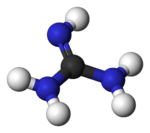Guanidine
- Guanidine
-
| Guanidine |

 |
| Général |
| No CAS |
113-00-8 |
| Code ATC |
A07AB03 |
| SMILES |
|
| InChI |
InChI : Vue 3D
InChI=1/CH5N3/c2-1(3)4/h(H5,2,3,4)/f/h2H,3-4H2
|
| Apparence |
déliquescent |
| Propriétés chimiques |
| Formule brute |
CH5N3 [Isomères]
|
| Masse molaire[1] |
59,0705 ± 0,0018 g·mol-1
C 20,33 %, H 8,53 %, N 71,14 %,
|
| Propriétés physiques |
| T° fusion |
50 °C |
| T° ébullition |
décomposition à 160 °C |
| Solubilité |
soluble dans l'eau, l'alcool |
| Écotoxicologie |
| DL50 |
souris : 350 mg·kg-1 |
|
Unités du SI & CNTP, sauf indication contraire.
|
La guanidine est un composé cristallin formée lors de l'oxydation de la guanine. Elle est utilisée dans la production de plastiques et d'explosifs. Elle se trouve également dans l'urine, étant un produit du métabolisme.
Elle n'est pas commercialisée telle quelle, mais sous forme de sel (chlorhydrate, acétate, carbonate,...). Elle peut également céder un proton. Son pKa est de l'ordre de 20.
Utilisation
Les sels de guanidine sont des agents chaotropiques qui déstabilisent les interactions faibles impliquées dans la structure spatiale des protéines. Pour cette raison, ils sont utilisés pour provoquer la dénaturation des protéines.

structure générale d'une guanidine

Guanidine pour usage au laboratoire.
Notes et références
Wikimedia Foundation.
2010.
Contenu soumis à la licence CC-BY-SA. Source : Article Guanidine de Wikipédia en français (auteurs)
Regardez d'autres dictionnaires:
guanidine — ● guanidine nom féminin Composé apparenté à l urée, obtenu en oxydant la guanine. (Présente dans certains aliments [navets, champignons, germes de blé, moules], la guanidine, stimulant des muscles, est en outre importante par ses dérivés :… … Encyclopédie Universelle
Guanidine — Gua ni*dine, n. (Physiol. Chem.) A strongly alkaline base, {NH2.CNH.NH2}, formed by the oxidation of guanin, and also obtained combined with methyl in the decomposition of creatin. Boiled with dilute sulphuric acid, it yields urea and ammonia.… … The Collaborative International Dictionary of English
guanidine — [gwä′nə dēn΄, gwä′nədin] n. [< GUANINE] a strongly poisonous crystalline base, (NH2) 2C:NH, normally found in the urine as a result of protein metabolism … English World dictionary
Guanidine — Chembox new Name = Guanidine ImageFile = Guanidine 2D skeletal.png ImageName = Skeletal formula of guanidine ImageFile1 = Guanidine 3D balls.png ImageName1 = Ball and stick model of guanidine IUPACName = Guanidine Section1 = Chembox Identifiers… … Wikipedia
guanidine — guanidinas statusas T sritis chemija formulė HN=C(NH₂)₂ atitikmenys: angl. guanidine; iminocarbamide; iminourea rus. гуанидин; иминокарбамид; иминомочевина … Chemijos terminų aiškinamasis žodynas
Guanidine nitrate — chembox new ImageFile = Guanidinium nitrate.png ImageSize = 200px IUPACName = Guanidinium nitrate OtherNames = Section1 = Chembox Identifiers Abbreviations = CASNo = 506 93 4 EINECS = 208 060 1 PubChem = 10481 SMILES = C(=N)(N)N. [N+] (=O)(O) [O… … Wikipedia
guanidine phosphate — guanidinfosfatas statusas T sritis chemija formulė H₂NC(=NH)NHPO₃H₂ atitikmenys: angl. guanidine phosphate rus. гуанидинфосфат … Chemijos terminų aiškinamasis žodynas
guanidine — noun Etymology: International Scientific Vocabulary, from guanine Date: circa 1864 a base CH5N3 derived from guanine that in the form of its hydrochloride acts as a parasympathetic stimulant and is used especially to denature proteins … New Collegiate Dictionary
guanidine — /gwan i deen , din, gwah ni /, n. Chem. a colorless, crystalline, strongly alkaline, water soluble solid, CH5N3, used chiefly in the manufacture of plastics, resins, rubber accelerators, and explosives. Also called carbamidine, iminourea. [1860… … Universalium
guanidine — noun A strong base HN=C(NH) obtained by the oxidation of guanine … Wiktionary




